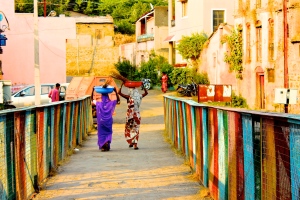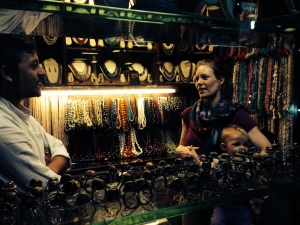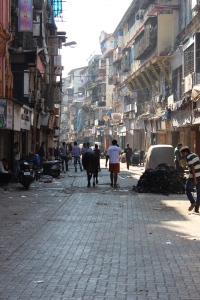Meet Our Partner: Ruhamah Designs
For our October blog post we are excited to bring you a Q&A session with Leah Henck. Until earlier this year Leah was the Managing Director of Ruhamah Designs, a for-profit business enterprise launched by Freedom Firm to provide sustainable employment for sex trafficking survivors throughout India.

YOU HELPED FOUND AND START RUHAMAH DESIGNS- CAN YOU TELL ME A LITTLE BIT ABOUT THAT? WHEN DID IT START, WHERE DID THE VISION COME FROM, AND WHY DID YOU GET INVOLVED?
Well, it actually began before I came. It was originally a part of the aftercare home that was in Ooty [India], a part of Freedom Firm, and it started as sort-of an art therapy project. [It] was started by Mala Malstead, the wife of Greg Malstead- they co-founded Freedom Firm together. It was her brainchild to try to do something in terms of art therapy with the girls. Then products just started coming out of that- whether it was bracelets, necklaces, or earrings, and they started either giving [them away] or using them to raise funds in the USA. And it just started to grow from there. That as an art-therapy project began more around 2007-2008, and I joined alongside with my husband in 2009 when I came to India, but I didn’t find a place until quite a bit later- about a year later. Mala came to me and said, “You know what, this art therapy project, this jewelry program is growing and it’s starting to make some money, and we are beginning to look at it as having potential to employ more girls.” So I jumped on board with that in March 2010 doing entrepreneurial work, and I took that and wanted to take the project into actually being a business.
WHERE IS YOUR ORGANIZATION LOCATED?
Our organization is located in India. Ruhamah started in Ooty, Tamil Nadu, which is the southern most state in India. Now we have four locations- Ooty (where it started), Puna (where I live), and then we also have two new locations in Kolkatta and Nagpur.
WHAT IS THE INSPIRATION BEHIND THE NAME OF YOUR ORGANIZATION?
[The name] "Ruhamah" comes from the Bible. [In the Book of Hosea] God gave Hosea the name ["lo ruhamah"] for his daughter, and it meant, "not loved." But then God said, "I'll change the name, and she who is 'not loved' will be called 'my love.'" So then [God] changes Hosea's daughter's name to "ruhamah." Looking at the background of these girls, and then the desire to see how their lives can change, and the desire that God has for them- they are His loved ones. That is where “Ruhamah” came from.
RUHAMAH IS A FOR-PROFIT BUSINESS THAT EMPLOYS SURVIVORS OF SEX TRAFFICKING. WHY DID YOU GO THAT ROUTE INSTEAD OF FORMING IT AS AN NGO, OR NON-PROFIT?
It sort-of started as an NGO, a non-profit, but we changed the format because I saw [for-profit] business as a perfect vehicle for growing a sustainable operation. [With this model] you’re not necessarily relying on hand outs from others; it can grow and return profits for more growth, if it’s run well. Seeing how it could spread and last much longer and become an entity that could last from its own efforts, rather than being reliant on something else, a [for-profit] business model was good looking in terms of growth and longevity.
WHAT ROLE DOES RUHAMAH PLAY IN THE REHABILITATIVE PROCESS FOR SEX TRAFFICKING SURVIVORS?
We hire girls; usually it’s a couple steps down the line from when they were first rescued [from sex trafficking]. Many of them have already been in either a program or a rehabilitation home for a little time before that. They all come to us with many needs. We’re hoping to be their “first step” to help them get back into healthy communities, being reintegrated into mainstream. They’re welcome to stay with the business as long as they want- they can make it their career if they want. We also hope that it will be one step of many as they go forward and go onto other jobs. Our hope is that in their workplace they can learn skills that will prepare them for that, whether it’s coming to work on time or showing respect for your co-workers or your boss. Then naturally through the workplace many problems come up, whether it’s fights between co-workers, disrespect, improper behavior- many things come up in just the day-to-day working because you’re so closely connected with these girls. In that context, we’re able to either bring corrective action or bring teaching and counseling. We do have daily Bible study, daily devotions with the girls in the mornings.
YOU'VE RECENTLY STEPPED OUT OF YOUR POSITION WITH RUHAMAH. WHAT WAS THE IMPETUS FOR THIS CHANGE?
I worked with Ruhamah from March 2010 to March 2014. In March 2014 I resigned from my position because I was having my second child, and I needed to be able to focus on my family. I’ve remained connected with Ruhamah, and I’m still happy to be there as an advisor for support. But, I am no longer involved in the day-to-day.
CAN YOU TELL US A LITTLE MORE ABOUT THE RELATIONSHIP BETWEEN RUHAMAH AND FREEDOM FIRM?
Ruhamah began first as very much a part of Freedom Firm [as a therapeutic aspect of] the aftercare home. My role in the beginning of setting up Ruhamah was to try and distinguish between the two. It went from a project under an existing NGO to being a new and separate—but related—for-profit business. So I was trying to pull them apart and distinguish how they operate. We went through a period of time where we were constantly having to decide what went where, saying, “This is Freedom Firm, that is Ruhamah.” Now that we have made that distinction, it has come again more under the umbrella of Freedom Firm as being almost a forth prong of the goals that Freedom Firm has in terms of rehabilitating the girls and as a tool that we have in terms of helping them. It looks more like a partnership now, or even as an arm [of Freedom Firm].
WHAT WOULD YOU SAY IS THE MOST CHALLENGING ASPECT OF YOUR WORK AT RUHAMAH?
I think the interpersonal is challenging. You are working directly day to day with girls that can sometimes be difficult. You are sometimes faced with behavioral challenges and determining how to [respond]. You’re constantly having to address these types of things and respond in a loving manner, as well as try to not allow behaviors that are dangerous or detrimental to others in the workplace. That is a challenge.
 ON THE FLIPSIDE, WHAT WOULD YOU SAY IS THE MOST REWARDING ASPECT OF YOUR WORK?
ON THE FLIPSIDE, WHAT WOULD YOU SAY IS THE MOST REWARDING ASPECT OF YOUR WORK?
Seeing how the girls grow and advance. It is a journey with them. None of them are by any means perfect or without problems or issues, but we do see change. One girl came to us one time—she was very defiant, very difficult in the beginning. Seeing her grow and soften and become more kind, she still has a lot of rough edges, but we have seen a lot of growth in her life—maturing in her life for the couple of years that she has been with us.
HOW DOES THE GOSPEL INFLUENCE THE WORK THAT YOU DO AT RUHAMAH?
It influences it a lot. We try to keep principles in the workplace such as encouraging the girls- “do your work unto the Lord, not unto man” whether people are watching or not. So we do try to put standards in the workplace. We also use [the gospel] as a counsel tool for us in how to deal with a girl- as far as when you have a problem, first go to them privately, then bringing step by step to higher authority. Encouragement- knowing that God has been patient and loving with us and knowing that we have to be patient and loving with them. It very much is a guide and a help for us, both in terms of the rules that we place in the workshop and the way that we deal with the girls and the encouragement that we need for ourselves.
HOW DOES YOUR PROFESSIONAL OR EDUCATIONAL BACKGROUND ASSIST YOU IN YOUR ANTI-TRAFFICKING WORK?
In 2008, my husband joined [Freedom Firm]. I [joined] as a volunteer in 2009. And then I started working with Ruhamah itself in 2010. The reason it took me a year to find my place was because Freedom Firm is very much a social work group- a lot of lawyers, social workers. There wasn’t really a place that first came to mind as far as where a person with an M.B.A. could fit in. But then this came to the forefront. Once I started the work with Ruhamah, my educational studies became a huge help. I think that no matter what you study there are ways you can apply it in terms of helping people.
WHAT IS ONE PIECE OF ADVICE THAT YOU WOULD GIVE TO SOMEONE WHO IS WANTING TO GET INVOLVED IN THE FIGHT AGAINST SEX TRAFFICKING?
I think definitely you can do something where you are. Prayer is a huge component that’s needed. You can look to get involved overseas, if that is what you feel like you want, though it certainly takes a longer-term commitment to be effective. It is helpful to go short term and see what is going on, but if you are able to make longer-term commitments it’s great to be a part. But even just being involved where you’re at- I think there are local communities that need Christ and need us to get involved. So prayer, getting involved locally, and if God calls you on a longer-term basis then do that.
IS THERE A SPECIFIC STORY THAT STANDS OUT TO YOU WITH YOUR WORK WITH TRAFFICKING VICTIMS THAT IS A SOURCE OF INSPIRATION FOR YOU?
There is one girl whose story [my husband, Evan] told me before he even went to India. It was one of the first girls that Freedom Firm had rescued, also one of the youngest that they had rescued. So when I came to India I got the chance to meet her while she was still in a government shelter home. Over the years, I’ve gotten to see her grow from being a relatively young teenager to now she has just turned 20, and we have grown to have sort of a little sister-big sister relationship over time and over several bumps in the road. She is the girl I was referring to that did work with Ruhamah for a couple of years and had [come to Ruhamah] defiant. I’ve seen her grow so much in maturity over the years. I think she is one of the girls I have connected with the most, and she is precious. She is precious to God. It is still a journey, she still makes poor choices sometimes, and doesn’t consult with me…she’ll make a poor choice without me because she knows that I’ll tell her not to do it. It’s a journey with her, I think even in our own lives God doesn’t fix us automatically, it’s a journey with Him. Step by step we walk with Him and step by step He walks with us. She is the one I will miss the most if God ever brings us back [to the United States].
IS THERE ANYTHING ELSE YOU WOULD LIKE TO SHARE WITH US?
It’s been very exciting to watch Ruhamah grow because as I’ve said, it was first a project, and I’ve seen it double in growth every year that I’ve been there. I’ve seen us open a new location every year that I’ve been there. As I’ve passed it on, it’s already continuing to grow. I feel like having been a [for-profit] business model, it has enabled it to have he funds and the structure to continue to grow to other places. I pray and I hope that Ruhamah will continue to grow


